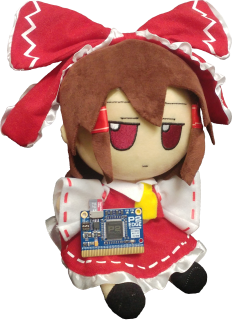Common Idioms and Tricks
Here are some common P2ASM code patterns for operations not obviously provided by the instruction set.
32x16 multiply
Chain two 16-bit MUL instructions together to multiply a 32-bit number with a 16-bit number. Often a better idea than using QMUL.
getword res,x,#0
mul res,y
getword tmp,x,#1
mul tmp,y
shl tmp,#16
add res,tmp
If calculating in-place, a getword can be omitted.
getword tmp,x,#1
mul tmp,y
shl tmp,#16
mul x,y
add x,tmp
TODO: Variant where Y is signed.
Signed QMUL
For the common case of only needing the bottom half of the result, there is no difference between signed/unsigned multiplication.
In case the entire result is needed:
qmul x,y
mov temp,#0
cmps x,#0 wc
if_b add temp,y
cmps y,#0 wc
if_b add temp,x
getqx lo
getqy hi
sub hi,temp
Signed QDIV
If only the dividend is signed (as is commonly the case):
abs x wc
qdiv x,y
getqx res
negc res
If both operands are signed, a slightly ugly construction is needed to XOR the signs. A somewhat nice way:
abs x wc
modz _c wz
abs y wc
qdiv x,y
getqx res
if_c_ne_z neg res
... but you could also store the flags into a register.
64-bit absolute
abs high wc
if_c neg low wz
if_c_and_nz sub high,#1
Nibble reverse
For reversing the order of nibbles in a long, i.e. $12345678 <-> $87654321. Useful for interacting with PSRAM and other QPI devices.
splitb x
rev x
movbyts x, #%%0123
mergeb x
Fast Cog/LUT RAM clearing
To clear (i.e. set to zero) a large area of cog RAM quickly, perform a block read from the unused area at $80000
setq #size-1
rdlong buffer,##$80000
The same works using SETQ2 for LUT RAM.
